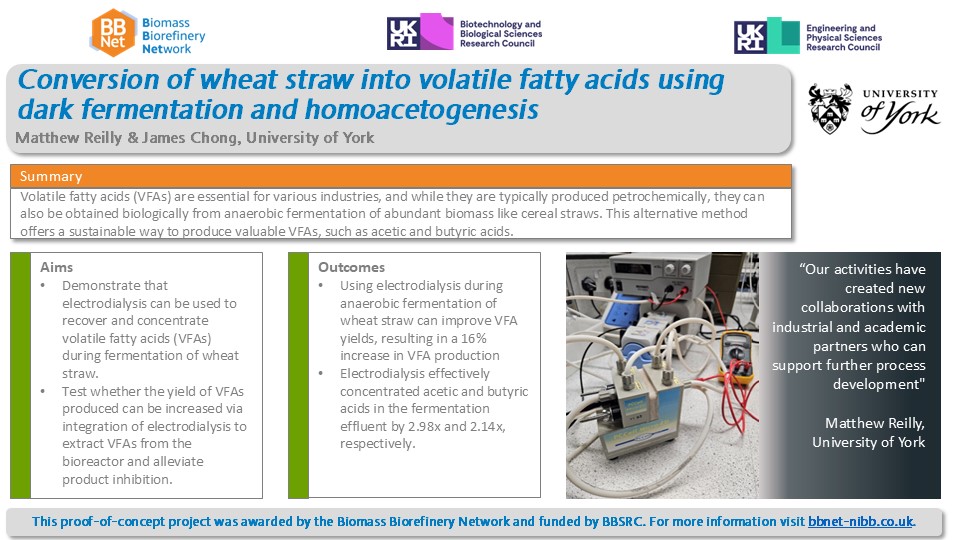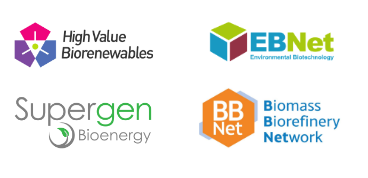Dark fermentation and homoacetogenesis to convert wheat straw into volatile fatty acids

- Project lead
- Matthew Reilly
- Institute
- University of York
Summary:
Volatile fatty acids (VFAs) are a group of valuable chemicals with a wide variety of industrial applications across the pharmaceutical, biofuel, food, cosmetics and manufacturing sectors. The uses for VFAs range from the production of electronic cables insulation to providing fragrance in perfume. Carbonovia Ltd. is an industrial partner on this project and the company is developing a novel biotechnology process which uses VFAs as a source of carbon for the clean and sustainable production of protein food products by microorganisms. Microbial production of protein is potentially beneficial over conventional protein production because microorganisms grow extremely quickly (compared to animals or plants) and this growth is not geographically restricted by requirements for land or particular weather patterns.
At present VFAs are industrially manufactured by using processes reliant on fossil fuels however VFAs such as acetic and butyric acids can be produced by fermentation of agricultural biomass and wastewaters. This presents an opportunity for Carbonovia and other companies to obtain VFA chemicals through biological routes via fermentation of cheap and renewable biomass sources such as cereal straws which are nationally (20 million tonnes y-1) and globally abundant (2 billion tonnes y-1). However fermentative VFA yields are restricted due to unwanted conversion of biomass into CO2 and susceptibility to loss of acetic acid to production of CH4 by methanogens. This project aims to maximise fermentative VFA yields from wheat straw feedstock by manipulating the growth conditions of a robust community of anaerobic organisms to mitigate losses in CO2 by performing homoacetogenesis and be unfavourable for methanogenic activity.
Aims:
The first aim of this project is to demonstrate that electrodialysis can be used to recover and concentrate volatile fatty acids (VFAs) during fermentation of wheat straw. The second aim is to test the hypothesis that the yield of VFAs produced, during dark fermentation containing wheat straw, can be increased via integration of electrodialysis to extract VFAs from the bioreactor and alleviate product inhibition.
Outcomes:
Volatile fatty acids (VFA) are organic compounds with a wide variety of industrial applications (e.g. polymer production, fragrance and flavouring). VFAs are currently manufactured by using petrochemical processes, however valuable VFAs such as acetic and butyric acids occur naturally in anaerobic microbial communities. This presents an opportunity to obtain these chemicals biologically via fermentation of cheap and renewable biomass sources such as cereal straws which are nationally (20 million tonnes per year) and globally abundant (2 billion tonnes per year). The primary goal of this project was to demonstrate proof-of-concept that using electrodialysis can improve VFA yields, during the anaerobic microbial conversion of wheat straw, by removing product inhibition to promote the flow of carbon through dark fermentation and homoacetogenesis pathways. Electrodialysis is a separation technique that uses electrical current to ionise solutes and can extract VFAs from fermentation processes across ion exchange membranes.
Here we successfully demonstrated that electrodialysis consisting of a 5-membrane-stack and powered by 24V was able to extract and concentrate a range of VFAs (e.g. acetic and butyric acids) from the fermentation broth containing alkaline pre-treated wheat straw and sewage sludge. Performing electrodialysis for 3 hours on day-5 of fermentation extracted 57% of VFAs and subsequently increased the overall VFA yield from biomass by 16% after 10 days, compared to the (no electrodialysis treatment) control bioreactor. This included a 25% yield increase in acetic acid and 20% more butyric acid. Furthermore, electrodialysis was used to concentrate acetic and butyric acid in fermentation effluent by x2.98 and x2.14, respectively.
Impact:
VFAs can be used as substrates for organisms in a wide range of biotechnology processes such as bioplastic, biohydrogen or biomethane production. Cereal straws represent a large potential source of renewable biomass feedstock. Therefore, increasing VFA yields from straw, is beneficial for the economics of VFA-utilising green biotechnology processes.

Academic partners: Dr. Matthew Reilly, University of York; Prof. James Chong, University of York








